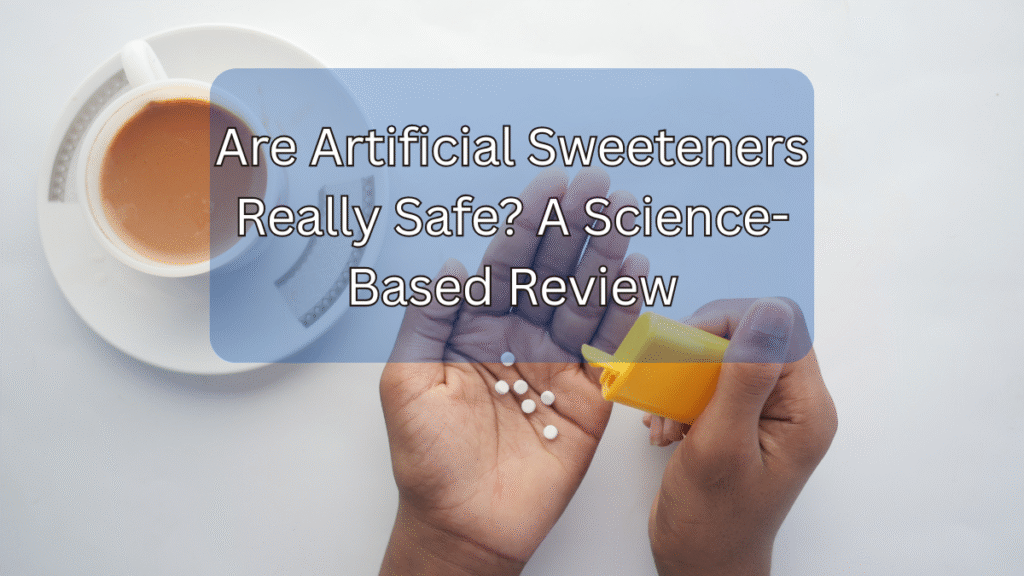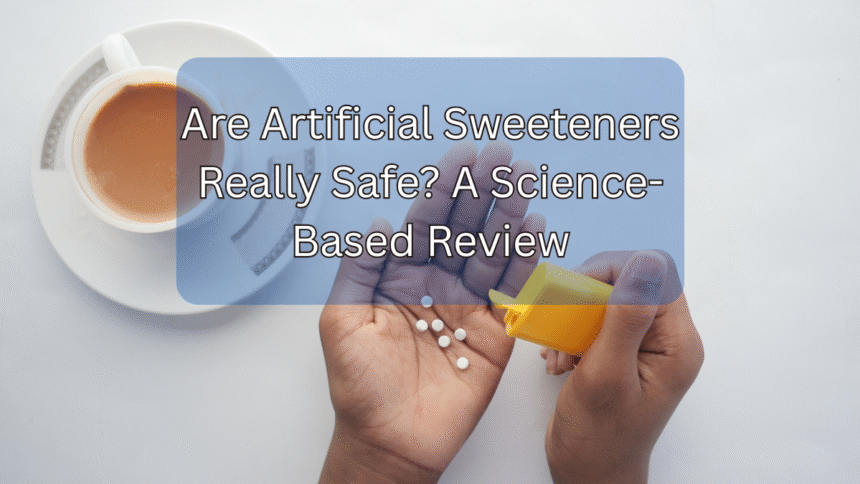Artificial Sweeteners?
Artificial sweeteners have become a staple in modern diets, promising the sweetness of sugar without the calories. But as their popularity grows, so do concerns about their safety. Are these sugar substitutes truly harmless, or could they pose hidden risks? In this science-based review, we’ll dive deep into the research, debunk myths, and provide practical tips to help you make informed choices.

What Are Artificial Sweeteners?
Artificial sweeteners, also known as non-nutritive sweeteners, are synthetic sugar substitutes designed to provide sweetness with minimal or no calories. Common examples include:
- Aspartame (Equal, NutraSweet)
- Sucralose (Splenda)
- Saccharin (Sweet’N Low)
- Stevia (a natural zero-calorie sweetener, though often grouped with artificial options)
- Acesulfame Potassium (Ace-K)
These sweeteners are found in diet sodas, sugar-free snacks, and even some toothpaste brands. But are they safe for long-term use? Let’s examine the science.
The Safety Debate: What Does the Research Say?
1. Regulatory Approval
Most artificial sweeteners have been approved by major health organizations, including:
- The FDA (U.S. Food and Drug Administration)
- The EFSA (European Food Safety Authority)
- The WHO (World Health Organization)
These agencies have set acceptable daily intake (ADI) limits, which are far higher than what most people consume. However, some studies suggest potential concerns beyond these guidelines.
2. Potential Health Risks
While artificial sweeteners are generally considered safe in moderation, research has raised questions about their long-term effects:
- Weight Gain & Metabolic Issues – Some studies suggest artificial sweeteners may disrupt metabolism, leading to increased cravings and weight gain.
- Gut Health Disruption – Emerging research indicates that sweeteners like sucralose may alter gut bacteria, potentially affecting digestion and immunity.
- Increased Diabetes Risk – Some observational studies link frequent artificial sweetener use to higher type 2 diabetes risk, though causation isn’t proven.
- Possible Cancer Concerns – Early animal studies linked saccharin to bladder cancer, but human studies found no strong evidence.
3. Psychological Effects
Artificial sweeteners may trick the brain into expecting calories, leading to increased hunger and overeating later. This could explain why some people don’t lose weight despite switching to diet products.
Video Credits
Tips for Using Artificial Sweeteners Safely
If you choose to use artificial sweeteners, here are some science-backed tips to minimize risks:
- Moderation is Key – Stick within the ADI limits set by health authorities.
- Choose Natural Alternatives – Stevia and monk fruit are plant-based options with fewer reported side effects.
- Monitor Your Body’s Response – If you notice bloating, headaches, or cravings after consuming sweeteners, consider reducing intake.
- Read Labels Carefully – Many processed foods contain hidden artificial sweeteners.
- Prioritize Whole Foods – Reduce dependence on sweeteners by enjoying naturally sweet foods like fruits.
Final Verdict: Should You Avoid Artificial Sweeteners?
The current scientific consensus is that artificial sweeteners are safe for most people when consumed in moderation. However, they aren’t a magic solution for weight loss or health. If you rely on them heavily, it may be worth reassessing your diet.
Key Takeaways:
✅ Generally recognized as safe by major health agencies.
⚠️ Potential risks (gut health, metabolism) need more research.
🍎 Natural alternatives like stevia may be a better option for some.
⚖️ Balance and moderation are crucial.
What’s Your Experience?
Have you noticed any side effects from artificial sweeteners? Or do you swear by them for weight management? Share your thoughts in the comments below!
If you found this review helpful, don’t forget to share it with friends and subscribe for more science-based health insights.











